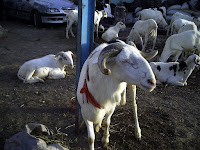African Culture III - makes the word "No" Hallo zusammen,
sorry, dass ich so nix have written long, but it was a lot of work a week. I also this week was a bit sick. I've actually had ne cold. I can not get otherwise never ne cold, but apparently my body has adapted more quickly than I thought. Last week I got two really pretty at night, frozen at 15-20 ° C. And in the morning I wear now always NEN sweater or jacket to work ne, it's just too cold right now. That the Africans are saying here!
But you have it, too nice and cold at home and be sure all the Christmas stress and thus have no time, so it's not so bad. Christmas is here, unfortunately, not really exciting, we are working on 24 and at 26.12, as only the 25th official Feiertag ist. Den Moslems ist das Fest nactürlich ziemlich wurscht, interessanter Weise habe ich letzten Freitag festgestellt, dass es für viele Katholiken hier eigentlich euch nur ein "Fest" ist, an dem man feiert. Eine jüngere Patientin wollte keinen Termin am 26., weil sie am Tag davor feiern und trinken (die Katholiken dürfen ja...) geht und dann am nächsten Tag nicht fit ist!

Aber eigentlich wollte ich euch etwas neues zum Thema kulturelle Unterschiede erzählen. Und zwar geht es um das Wörtchen "Nein". Eigentlich ist es prinzipiell unmöglich bzw. sehr unhöflich eine Bitte, egal welcher Art mit einem "Nein" zu beantworten. Stattdessen behilft man sich mit small excuses or lies simply: "Yes, I do", "we have in stock," "I consider it my" etc. or do you say "maybe tomorrow", which is ok, even if no one has the intention what to buy tomorrow. But it leaves room for possibilities and has not from the other. This is the principal cause of the whole. It has not made a request or question, but the Indiviuum, man. This means that you lie to the thousands of dealers who want something from a sale or what do can not really say no, instead they would have to be polite ... strange predicament: honest and rude or lie and be polite. For
a Tubab (White) is the at least here in Dakar still ok, because people are accustomed to that we are simply rude. In the cabinet can
is also sometimes a problem because people come with strange requests or inquiries and say my Assi not say "no" because he is from Senegal. Then he asks me again and run some more after the same pattern. He knows that the answer is no to the patient questionnaire, but he can not say. So he asks me and I say with a grave voice, "No", while it does not really matter what I say as long as the English phrase "No" and "possible" contains. Then he can explain that the doctor said "no" and push it on me, so to speak.
Last week, for example, were two girls there who wanted me to Shorten their front teeth because they were too long. I've explained why I do not know and refused (I would not do well in D), then I've continued to work and somehow they are not gone, so I asked what they do there? Well, they still want that I do it. Again explains, "Non possible". Nothing, just sitting still. So I told them that for me it looks as if her left leg was slightly longer and if I should cut something right, then I would also make the teeth (unfortunately they did not quite get the joke Sun checked). In any case, musste ich zum Schluss schon fast ein bisschen unfreundlich werden, damit sie einsehen, dass ich das auf KEINEN Fall machen werde.
So, schöne Woche noch bis Weihnachten, vllt fotografier ich noch einen der lustigen Händler, die mir immer einen der ultrahässlichen Aufblasnikoläuse verkaufen wollen.
Ciao, Michael









